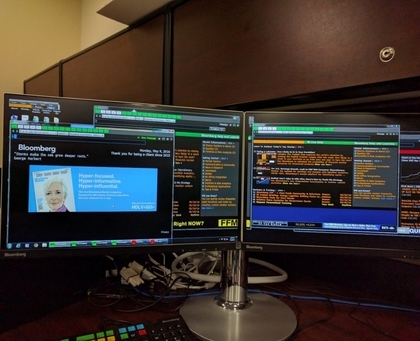My Experience with the Carlson Funds Enterprise (Fixed Income)
Tuesday, May 17, 2016
I am about to graduate in a few days, and it would be unfair to not write about the Lab/Class where I spent the maximum amount of my time over the past two years i.e., the Carlson Funds Enterprise (CFE). I must mention that I spent most of my time there not because CFE always entailed a lot of work but because it was also my ‘default’ place in school to sit and work, though I did have my fair share of busy days because of CFE. Carlson Funds Enterprise runs a student managed fund with approximately $37M worth of assets under management. The fund is divided almost equally between a fund invested primarily in stocks and a fund invested primarily in bonds. They are called Carlson Growth Fund (CGF) and Carlson Fixed Income Fund (CFIF) respectively.
The director of the Fixed Income fund is Susanna Gibbons, and the academic advisor is Rick Nelson. They are the people responsible for making my experience interesting and engaging at CFIF. On a somewhat different note, Debt Markets, taught by Rick, also happens to be my favorite course during my MBA.
The Enterprise program is two and a half semester engagement so I started the Enterprise during my B term (each semester is divided into two terms of seven weeks each) of my second semester. Upon joining, each student was classified into an industry group and, given my technical background and interest in the industry, I chose to follow the TMT (Technology, Media & Telecom) industry. During the first seven weeks I just listened to the class discussions about the economy, markets, industries, and the portfolio. The discussion was fairly technical. It took some time to get the hang of what people were talking about, so I just plugged in, asked questions and tried to learn what the graduating class had been doing. Those seven weeks also ensured that I didn’t make a fool of myself in the first few days of my summer internship, and I eventually ended up doing a good job. I interned at an asset management firm in St. Paul called Advantus Capital Management which manages assets for its parent insurance firm Securian Financial Group. In fact, the reason I was even considered for the position was because of my involvement with CFE.
During the summer, we used to have one meeting every month where we had discussions about the companies in our industry we have been following, the portfolio performance and took turns generating and sending our monthly performance reports to our clients. CFE also has a great mentor program where every student is paired with a senior CFE alum who has been working in the industry and willing to guide us as we try to find our place for ourselves in the financial services or related industry.
During fall we became more engaged in the activities of the fund. Each class had a discussion around the economy, interest rates, our portfolio and new issues by corporate issuers. As the class progressed those discussions became more matured and interesting. We developed credit models for two companies, prepared an industry report culminating into an elaborate investment thesis putting together all the pieces we had learned so far. The thesis was for a new company that we wanted approved as a potential name we could include in our portfolio. We then had to pitch our recommendation to and defend our stand in front of our mentors who would then vote if it was a good or a bad idea. Our recommendation was approved unanimously.
Come spring, the CFE class looked considerably larger. It was because the incoming class started in the A term so that they could get more ‘overlap’ with us. During spring, I also became more involved in the CFIF, I started participating more actively in collecting data and generating the monthly performance reports and also became one of the designated traders for the fund. What it meant was that I was supposed to talk to the brokers at firms we had relationships with such as RBC, Morgan Stanley, US Bank, and Piper Jaffray whenever we wanted to buy or sell any bonds. It also meant sending out the settlement instructions to the custodians post any trade. This was an interesting experience because trading a bond was not as straight forward as trading a stock. In the end we had a similar investment thesis and presentation pitching for another company we thought was worth buying. We sailed through again.
Overall, I believe the CFE was a great learning experience for me. Post MBA, I’m going to work in my preferred industry i.e., tech, and following that industry for over a year came in handy during job interviews. I see most of my CFE friends finding jobs in corporate finance, corporate development, Investment banking, investment research and related roles graduating from CFE. I feel lucky to have worked with this bunch of smart and driven individuals who could likely become CEOs and CFOs in the future.
P.S: The picture is just for effects, the transition from black UNIX screens (from my previous programming job) to black Bloomberg screens was an interesting journey, though.
